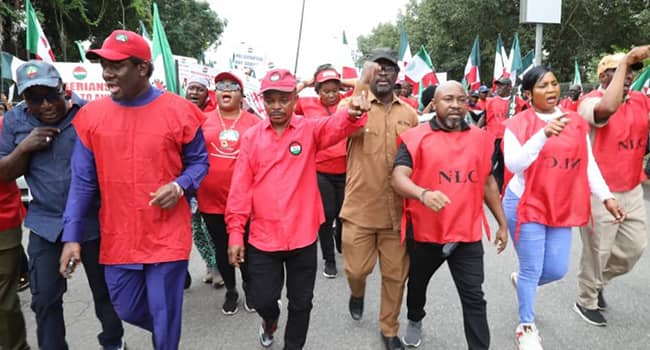Weeks of unresolved negotiations over the new minimum wage have put the Nigerian Government and the Organized Labour on a collision course.
The impending conflict between labour unions, the Federal Government, and states threatens significant economic and welfare repercussions for Nigerian workers.
Labour unions are demanding a new national minimum wage that aligns with the current economic conditions and a reversal of the recent electricity tariff hike.
The Federal Government’s delay in concluding the minimum wage talks has led to widespread frustration among workers, who feel their concerns are being neglected.
The planned strike is expected to disrupt economic activities nationwide, with workers across various sectors, including healthcare, education, and transportation, set to participate.
This strike is not solely about the minimum wage but also a protest against the electricity tariff hike, which labour views as detrimental to the poor and working class.
The Nigerian Labour Congress (NLC) and the Trade Union Congress (TUC) had suspended a nationwide strike for a week, which ended on Tuesday at midnight.
NLC President Joe Ajaero stated that Organized Labour is awaiting President Bola Tinubu’s decision on the proposals submitted by the Tripartite Committee on Minimum Wage.
Speaking at the International Labour Conference in Geneva, Ajaero said, “Two reports have been sent to the President, and the NLC will await the next steps based on the President’s response. The National Executive Council will discuss and decide on the way forward once the President makes his decision.”
Ajaero criticized the state governors under the Nigerian Governors’ Forum for deeming the N62,000 minimum wage proposal by the Federal Government unsustainable.
The government-established tripartite committee has failed to reach a new minimum wage agreement after four meetings, resulting in a deadlock.
Labour unions have repeatedly rejected the government and private sector offers, walking out of negotiations three times, with the last walkout occurring on Friday, the deadline given to the government.
“Our position is very clear,” said Chris Onyeka, NLC Assistant General Secretary, on Channels Television’s The Morning Brief show. He stated that labour would not accept the government’s offer of N62,000 or the N100,000 proposal by some individuals and economists.
Onyeka asserted, “We will not negotiate a starvation wage. We are still at N250,000, which we consider a reasonable concession.”
In his Democracy Day speech on June 12, 2024, President Tinubu assured that an executive bill on the new national minimum wage would soon be sent to the National Assembly.
“We have negotiated in good faith with Organised Labour on a new national minimum wage. An executive bill will soon be sent to the National Assembly to formalize this agreement,” the President said.
He noted that during Labour’s national strike on June 3, 2024, no labour leaders were arrested or threatened. “Labour leadership was invited to negotiate towards a good-faith resolution, highlighting the importance of reasoned discussion and principled compromise in democracy,” he added.
